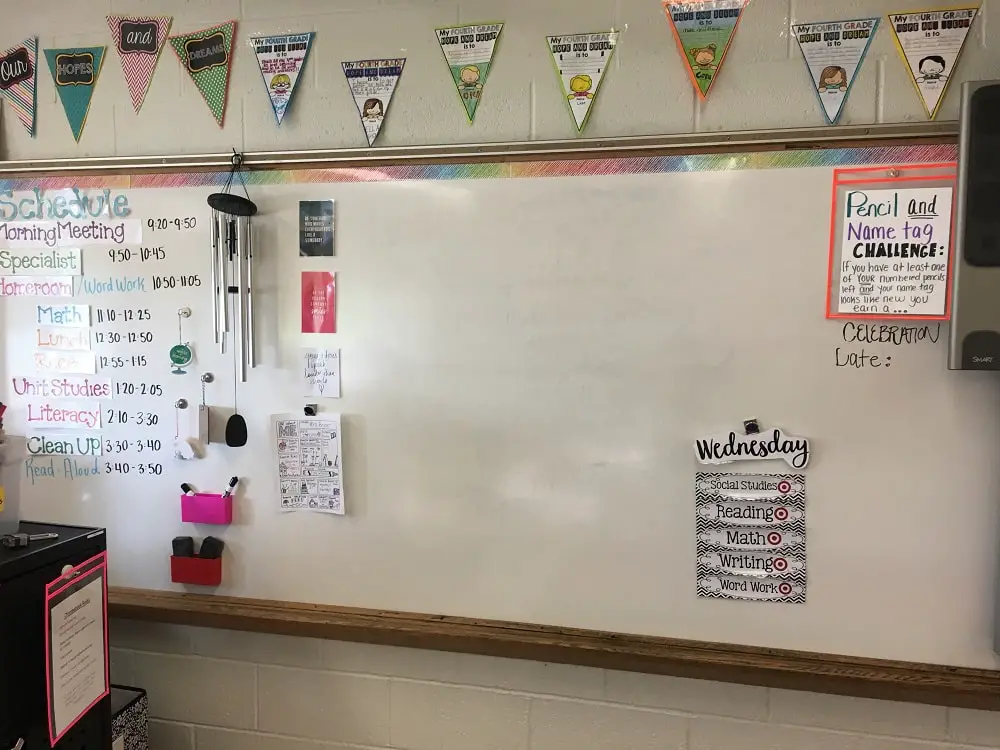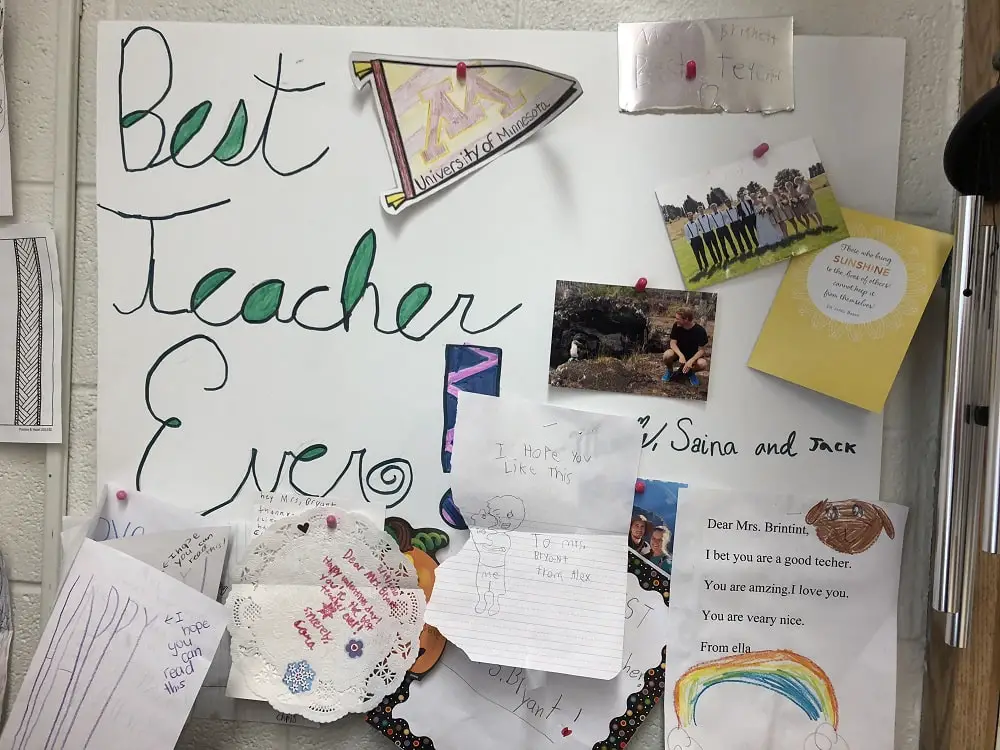Salary, Job Description, How To Become One, and Quiz
.jpg)
Elementary School Teachers
Elementary School Teachers teach academic and social skills to students at the elementary school level.
Table of contents
What they do
Elementary School Teachers teach academic and social skills to students at the elementary school level.
- Establish and enforce rules for behavior and procedures for maintaining order among the students for whom they are responsible.
- Adapt teaching methods and instructional materials to meet students’ varying needs and interests.
- Instruct students individually and in groups, using various teaching methods, such as lectures, discussions, and demonstrations.
- Confer with parents or guardians, teachers, counselors, and administrators to resolve students’ behavioral and academic problems.
Typical day
On a daily basis, Elementary School Teachers maintain accurate and complete student records as required by laws, district policies, and administrative regulations. They assign and grade classwork and homework.
A typical day for an Elementary School Teacher will also include:
- Establish and enforce rules for behavior and procedures for maintaining order among the students for whom they are responsible.
- Prepare for assigned classes and show written evidence of preparation upon request of immediate supervisors.
- Prepare objectives and outlines for courses of study, following curriculum guidelines or requirements of states and schools.
- Plan and conduct activities for a balanced program of instruction, demonstration, and work time that provides students with opportunities to observe, question, and investigate.
- Establish clear objectives for all lessons, units, and projects and communicate those objectives to students.
Other responsibilities
Besides their typical day, Elementary School Teachers also attend staff meetings and serve on committees, as required. They may also attend professional meetings, educational conferences, and teacher training workshops to maintain and improve professional competence.
On a weekly to monthly basis, Elementary School Teachers involve parent volunteers and older students in children’s activities to facilitate involvement in focused, complex play. They might also meet with other professionals to discuss individual students’ needs and progress.
In addition, they meet with parents and guardians to discuss their children’s progress and to determine priorities for their children and their resource needs.
Although specific duties may vary, many of them organize and label materials and display students’ work.
To some Elementary School Teachers, it is also their responsibility to prepare, administer, and grade tests and assignments to evaluate students’ progress.
What is the job like
Job satisfaction
Is this job meaningful
73% said they were satisfied with their job and 73% said they found their job meaningful.

My name is Paige Bryant and I am a 4th-grade teacher. As a 4th grade teacher, I teach reading, writing, math, social studies, and science on a daily basis. But teaching elementary school goes way beyond academics. You are teaching social skills and coping strategies. Some days you act as a counselor, social worker, advocate, or chaperone.
You get to watch students grow in all sorts of ways throughout your year spent with them and it is unbelievably rewarding.
My typical day
Being a fourth-grade teacher your day usually starts 1-2 hours before students arrive. This time is spent in several different ways. Usually, once a week you will have a formal collaboration time with your team (other fourth grade teachers) where you will discuss upcoming units, field trips, grading, and other day-to-day items that come up. On other days you will be informally meeting with other fourth-grade teachers to plan lessons, plan the day, and discuss concerns. Team collaboration is so essential to make sure everyone is feeling comfortable and ready for the upcoming day. A few days a month you will have a school-wide staff meeting. These meetings could focus on professional development, safety reviews, fundraising, etc. Every morning when you are not in meetings you will be planning for your upcoming day and upcoming lessons. Planning for lessons could consist of making copies, making slideshows, cutting up activities, reading and writing lessons, or searching google for fun activities to do.
During the day you are constantly watching the clock to make sure you are on schedule. In fourth grade, your students will move to other locations (classrooms, lunchroom, etc.) during the day and you need to make sure you are on time. When students first arrive in the morning you will have a “morning activity” for them to do. This could look like an academic worksheet, playing board games, or working with hand on manipulatives. For your core lessons, math, and reading/writing you will plan lessons to teach your objectives, do practice as a group, and then allow students to do independent or small group activities.
You will get a prep time, which is usually 45-60 minutes during the day where your students are with a different teacher. This time is used as additional planning time or collaboration time with other teachers. Often times you are getting ready for the next time spent with students.
A huge component of teaching elementary school that often doesn’t get talked about outside of being a teacher is the need for strong classroom management. As a teacher, you need to have a plan to know how students will line up, where they will sit when they will sit where, how you want them to ask a question, what are your expectations during different times of the day, and much more. Classroom management is something that will adjust each year, semester, month, or maybe a week depending on your group of students. There will be trial and error and lots of trying new things.
Here is a list of “Other” activities you will do outside of academics and planning
- Planning and executing field trips! These days are fun but also extremely exhausting!
- You give extra recess time and plan fun classroom parties for the different holidays.
- Throughout the year you will get new students and lose some of your students. It’s amazing how this can completely shift classroom dynamics.
- You will prepare students for and monitor state testing.
- You will respond to endless emails from parents. Emails may have concerns, questions, or feedback.
- You will always need to know how students are getting home and oftentimes will spend time reaching out to parents to figure out any changes.
- You will deal with classroom disagreements and unwanted behavior. You will collaborate with the principals and parents of students who need help with behavior.
- You will coordinate with other teachers for reading intervention, math intervention, and special ed depending on student needs. You may also work with the school social worker for help with teaching social skills or to address social concerns.
- If you are a new teacher you will be on probation for your first three years where you will have several formal observations done with your principal(s).
- You will attend baby showers, retirement parties, and wedding showers for your coworkers.
Pros
- It is endlessly creative (which can also be a con, due to how much time this can take up). You get to create lessons that try to spark interest in your students and meet them where they are at.
- It’s fun! Your students will make each day unique and entertaining. At the end of each day, you will have stories to tell that make you laugh.
- Every day is different. You will never be doing the same thing, as such, you will never be bored.
- The relationships you build with your fellow teachers is a bong like no other
- The relationships you build with your students are life-changing and you will cry when you say goodbye at the end of the year.
- You feel like you are making a difference. You get to see students grow and change throughout the year and you know that you are making an impact on their life.
Cons
- It’s exhausting, especially in your first years. You are doing so much and your energy is going so many places. I am often at school 1-2 hours before students arrive and in the evenings I am doing school work for 1-3 more hours.
- Lots and lots of meetings, which are necessary but they often feel like they are taking away from getting tangible things done for your students
- You will encounter quite a few teachers who are burnt out of the profession and this takes away from your excitement about your job
- The constant emails and calls from parents. You are extremely accessible and some parents take full advantage of that.
Pros
Suitable for people who like to help and teach others.
Suitable for people who value relationships between co-workers and customers and want to work in a friendly non-competitive environment.
This career is perfect for people who love to work indoors.
Good salary (earns more than 50% of the careers out there).
Cons
Not suitable for people who like practical and hands-on work.
It is hard to get into this career. A considerable amount of work-related skill, knowledge, or experience is required for this career.
Long working hours (More than 40 hours per week).
How much do they make
Average salary
Average hourly wage
Entry-level Elementary School Teachers with little to no experience can expect to make anywhere between $40,030 to $48,350 per year or $* to $* per hour.
| Salary by experience | Annual | Hourly |
|---|---|---|
| Highest (Top 10%) | $100,480 | $* |
| Senior (Top 25%) | $79,120 | $* |
| Median | $60,940 | $* |
| Junior (Bottom 25%) | $48,350 | $* |
| No experience (Bottom 10%) | $40,030 | $* |
This table shows the top 10 highest paying industries for Elementary School Teachers based on their average annual salary.
| Salary by industry | Annual | Hourly |
|---|---|---|
| Elementary and Secondary Schools | $65470 | $* |
| Local Government | $64290 | $* |
| Social Advocacy Organizations | $60640 | $* |
| Colleges, Universities, and Professional Schools | $59290 | $* |
| Educational Support Services | $56620 | $* |
| Religious Organizations | $51270 | $* |
| Other Schools and Instruction | $49440 | $* |
| Other Residential Care Facilities | $49190 | $* |
| Individual and Family Services | $48300 | $* |
| Civic and Social Organizations | $46910 | $* |
View more salary by industries here.
Where can they work
Where can Elementary School Teachers work? Here is a table showing the top 10 largest employers of Elementary School Teachers including the average salary in that industry.
| Employers | Total Employed | Annual Salary | Hourly Wages |
|---|---|---|---|
| Elementary and Secondary Schools | 1356460 | $65470 | $* |
| Child Day Care Services | 1620 | $36830 | $* |
| Religious Organizations | 1420 | $51270 | $* |
| Colleges, Universities, and Professional Schools | 690 | $59290 | $* |
| Local Government | 620 | $64290 | $* |
| Educational Support Services | 510 | $56620 | $* |
| Other Schools and Instruction | 420 | $49440 | $* |
| Individual and Family Services | 280 | $48300 | $* |
| Social Advocacy Organizations | 110 | $60640 | $* |
| Other Residential Care Facilities | 40 | $49190 | $* |
What is the work day like
Working hours
Working schedule
How often do you use email in this job?
Telephone
How often do you have telephone conversations in this job?
Group discussions
How often do you have group discussions in this job?
Public speaking
How often does this job require you to do public speaking?
Level of competition
How much competitive pressure is in this job?
What is the work environment like
Office-style environment
Indoors in an environmentally controlled condition
Warehouse-style environment
Indoors in a non-controlled environmental condition such as a warehouse
Outdoors
Outdoors exposed to all weather conditions
Outdoors – Under Cover
Outdoors but under cover (e.g. structure with roof but no walls)
How to become one
Difficulty to become one
Required level of education
What level of education do you need to perform the job?
Relevant majors
Teaching French as a Second or Foreign Language
Teaching English as a Second or Foreign Language/ESL Language Instructor
Communication Arts and Literature Teacher Education
Environmental Education
Science, Technology, Engineering, and Mathematics (STEM) Educational Methods
International Teaching and Learning
Online Educator/Online Teaching
Early Childhood Education and Teaching
Waldorf/Steiner Teacher Education
Montessori Teacher Education
Teacher Education, Multiple Levels
Elementary Education and Teaching
Bilingual and Multilingual Education
Relevant work experience
How much related work experience do you need to get hired for the job?
On The Job Training
How much on the job training do you need to perform the job?
Should you become one
Best personality type for this career
People with this personality type likes to work with people and in teams. They prefer work that allows them to build relationships with others.
People with The Builder personality type likes practical and hands-on work. They prefer working with plants, animals, and real-world materials like wood, tools, and machinery.
People with The Thinker personality likes to work with ideas that require an extensive amount of thinking. They prefer work that requires them to solve problems mentally.
People with The Artist personality likes to work with designs and patterns. They prefer activities that require self-expression and prefer work that can be done without following a clear set of rules.
People with The Helper personality type likes to work with people and in teams. They prefer work that allows them to build relationships with others.
People with The Leader personality likes to start and work on projects. They also like leading people and making many decisions.
People with The Organizer personality type likes to follow set procedures and routines. They prefer working with data and details more than with ideas.
You can read more about these career personality types here.
People who are suitable for this job tend to like working with, communicating with, and teaching people. They like helping or providing service to others.
They also like working with forms, designs, and patterns. They often require self-expression and the work can be done without following a clear set of rules.
Take this quiz to see if this is the right career for you.
Work Values
Which values are the most important to a person’s satisfaction for this job?
You are someone who is results oriented. You prefer work that allows you to utilize your skills and abilities while at the same time giving you a sense of accomplishment.
You are someone who values job security, steady employment, and good working conditions. You also prefer work that keeps you busy all the time with something different to do every day.
You are someone who values job advancement and leadership roles. You prefer work that receives recognition for the work you do and jobs that are looked up to by others in the company and your community.
You are someone who likes to provide a service to others. You prefer a work environment where you can work with your co-workers in a friendly non-competitive environment.
You are someone who values a company that stands behind their employees. You prefer a work environment where everyone is treated fairly and is being supported by the company.
You are someone who likes to work on your own and make your own decisions. You prefer work that requires little supervision and are allowed to try out your own ideas.
Don’t know which career to pursue?
Take the career quiz to find careers that match your personality type.
Take The Career Quiz




.jpg)




.jpg)
.jpg)
.jpg)
.jpg)
.jpg)
.jpg)
.jpg)
.jpg)
